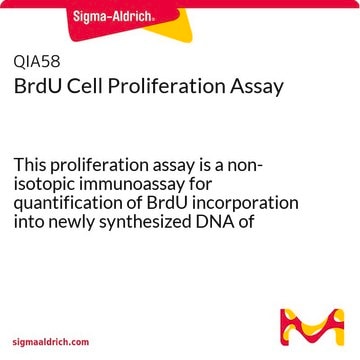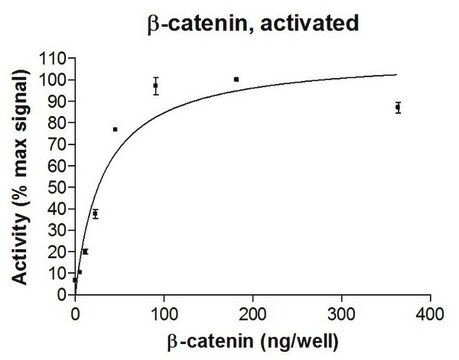05-157
Anti-MAP Kinase 2/Erk2 Antibody, clone 1B3B9
clone 1B3B9, Upstate®, from mouse
Synonym(s):
Extracellular signal-regulated kinase 2, MAP kinase 2, MAPK 2, Mitogen-activated protein kinase 2, extracellular signal-regulated kinase-2, mitogen-activated protein kinase 1, protein tyrosine kinase ERK2.
About This Item
Recommended Products
biological source
mouse
Quality Level
antibody form
purified immunoglobulin
antibody product type
primary antibodies
clone
1B3B9, monoclonal
species reactivity
avian, mouse, human, rat
manufacturer/tradename
Upstate®
technique(s)
immunoprecipitation (IP): suitable
western blot: suitable
isotype
IgG2a
NCBI accession no.
UniProt accession no.
shipped in
dry ice
target post-translational modification
unmodified
Gene Information
human ... MAPKAPK2(9261)
mouse ... Mapkapk2(17164)
rat ... Mapkapk2(289014)
General description
Specificity
Immunogen
Application
4 μg of a previous lot immunoprecipitated MAP Kinase 2/Erk2 from a RIPA lysate from mouse 3T3 cells. Boil the cell lysate and let cool before adding the antibody, as this antibody only binds to denatured MAP Kinase.
Signaling
MAP Kinases
Quality
Western Blot Analysis:
0.5-2 µg/mL of this lot detected MAP Kinase 2/Erk2 in RIPA lysates from human A431 carcinoma cells. A previous lot detected MAP Kinase in mouse 3T3 fibroblasts and rat L6 cells.
Target description
Linkage
Physical form
Storage and Stability
Handling Recommendations:
Upon receipt, and prior to removing the cap, centrifuge the vial and gently mix the solution. Aliquot into microcentrifuge tubes and store at -20°C. Avoid repeated freeze/thaw cycles, which may damage IgG and affect product performance.
Analysis Note
Positive Antigen Control: Catalog #12-301, non-stimulated A431 cell lysate. Add 2.5µL of 2-mercaptoethanol/100µL of lysate and boil for 5 minutes to reduce the preparation. Load 20µg of reduced lysate per lane for minigels.
Other Notes
Legal Information
Disclaimer
Not finding the right product?
Try our Product Selector Tool.
Storage Class Code
12 - Non Combustible Liquids
WGK
WGK 2
Flash Point(F)
Not applicable
Flash Point(C)
Not applicable
Certificates of Analysis (COA)
Search for Certificates of Analysis (COA) by entering the products Lot/Batch Number. Lot and Batch Numbers can be found on a product’s label following the words ‘Lot’ or ‘Batch’.
Already Own This Product?
Find documentation for the products that you have recently purchased in the Document Library.
Our team of scientists has experience in all areas of research including Life Science, Material Science, Chemical Synthesis, Chromatography, Analytical and many others.
Contact Technical Service



![[Val5]-Angiotensin II acetate salt hydrate ≥95% (HPLC), powder](/deepweb/assets/sigmaaldrich/product/structures/301/478/c093dfb8-a891-46ac-b6a1-655b77da7c03/640/c093dfb8-a891-46ac-b6a1-655b77da7c03.png)



